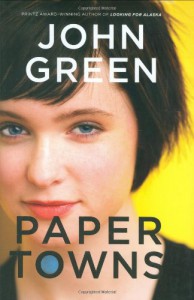6
Followers
6
Following
The Review Man
Formerly of Goodreads, now of both words, in the coming times only here?
Currently reading
Survival: A Thematic Guide to Canadian Literature
Lila: An Inquiry Into Morals
Simulacra and Simulation (The Body, In Theory: Histories of Cultural Materialism)
Leaven of Malice
The Salterton Trilogy
Effi Briest (Penguin Classics)
Empires of the Word: A Language History of the World
Cases And Materials On The Law Of Torts
Public Law : Cases Materials and Commentary
A Property Law Reader
 Is there anything worse than poorly-executed pretension? For some awful reason, John Green seems to have developed this skill (and only this skill) just in time for novel #3.
Is there anything worse than poorly-executed pretension? For some awful reason, John Green seems to have developed this skill (and only this skill) just in time for novel #3.Green completely recycles the faux-philosophical plot of his first two novels as a cash grab, riding the fame-wave of his equally faux-philosophical YouTube channel. The catcher’s calling for a changeup but the pitcher keeps throwing fastballs. (A John Green fastball is usually four minutes of hokum titled “Thoughts from Places”. I wasn’t aware it was possible to have Thoughts from Not Places, John. Thanks for raising my consciousness.)
What’s more, Green grabs the same male and female leads from book 1 and 2, changes their names and phones the rest in. Instead of real plot development, we’re treated to a cast of characters who are so ‘quirky’ that it’s vomit-worthy. And if the characters aren’t busy auditioning for the Twee Olympics, they’re disappearing for months at a time and living in abandoned buildings. That’s totally realistic, right? I mean, haven’t we all dropped off the face of the planet for a year or two to go find ourselves in some town that doesn’t actually exist? Good thing there’s no such thing as a Missing Persons Alert.
When Paper Towns' heroes aren't gallivanting around the country in yet another road trip escapade, they're throwing fish at each other or engaging in divers criminal activities (viz., breaking and entering, trespassing). You might be tempted to call this surrealism, but at least Dalí and Buñuel had the good sense to play their eccentricities for political satire or artistic innovation. With Green the reader will find no such thing.
Since it’s a John Green book, expect all the leads to be brilliant poetry-reciting geniuses. Expect loads of sexual tension between the slightly nerdy male hero and the uber-sexy, mysterious dreamgirl. Don’t expect the guy to get the girl though; rather, wait for Green to flimsily build his own cheap, flawed idea of 'closure', accompanied by a few stale platitudes straight out of a Deepak Chopra book. Is John Green secretly a 12-year-old hopeless romantic, or does he just write like one for kicks?
I don't know what possessed John Green to write this. (Well, actually I do; it's called money, but I digress.) What lesson did he mistakenly think he was imparting here? That dorky losers can get hot, ultra-intellectual girls without even trying? That if you have family problems, you should run away and live in an abandoned building? That giving characters annoying 'quirks' is a substitute for character development? (Black Santas and Omnictionary, I'm looking at you.) That life is anything like this book?
I hope I've convinced you to avoid Paper Towns like the plague. But wait—what if you've already read it? I suggest pretending it was all a bad dream (a narrative cliché that's surprisingly more compelling than most anything in Paper Towns itself). But what if you—heaven forbid—liked Paper Towns? Don’t worry! I hear Mr. Green just released a new novel; if you’re not yet tired of his formulaic hack work, maybe the fourth time’ll be the charm!











